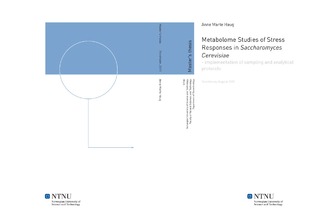Metabolome Studies of Stress Responses in Saccharomyces Cerevisiae : - implementation of sampling and analytical protocols
Master thesis
Permanent lenke
http://hdl.handle.net/11250/245766Utgivelsesdato
2011Metadata
Vis full innførselSamlinger
Sammendrag
As a part of cancer research and therapy, it is important to study metabolic responses caused by DNA damaging agents. Whereas earlier studies have focused on changes at protein levels caused by DNA damaging agents, this project focuses on establishment of sampling and cultivation protocols for metabolome analysis, using Saccharomyces cerevisiae as a model organism growing in exponential phase. Sampling and cultivations protocols were optimized before cultures were stressed by DNA damaging agent. At the time of sampling, cells and extracellular media were separated by filtration prior to quenching and extraction in 75% boiling ethanol. Solvent evaporation under reduced pressure and ambient temperature were used for metabolite concentration. Yeast cultures were exposed to osmotic stress and two concentrations of the DNA damaging agent 5-fluorouracil. Samples were taken prior to stress exposure, at the time of exposure and in intervals after stress exposure. Metabolite extracts were analyzed by GC-MS single quadrupole in respect of amino acids, citric acids cycle intermediates and fatty acids. Generally, citric acid cycle intermediates were most influenced by stress agents, followed by amino acids and fatty acids. GC-MS single quad was the only analytical method applied. For a more complete metabolic profiling, including other groups of metabolites, LC-MS/MS should be applied. This analytical method will cover groups, such glycolytic intermediates, which can not be analyzed by GC-MS, due to their volatility.
